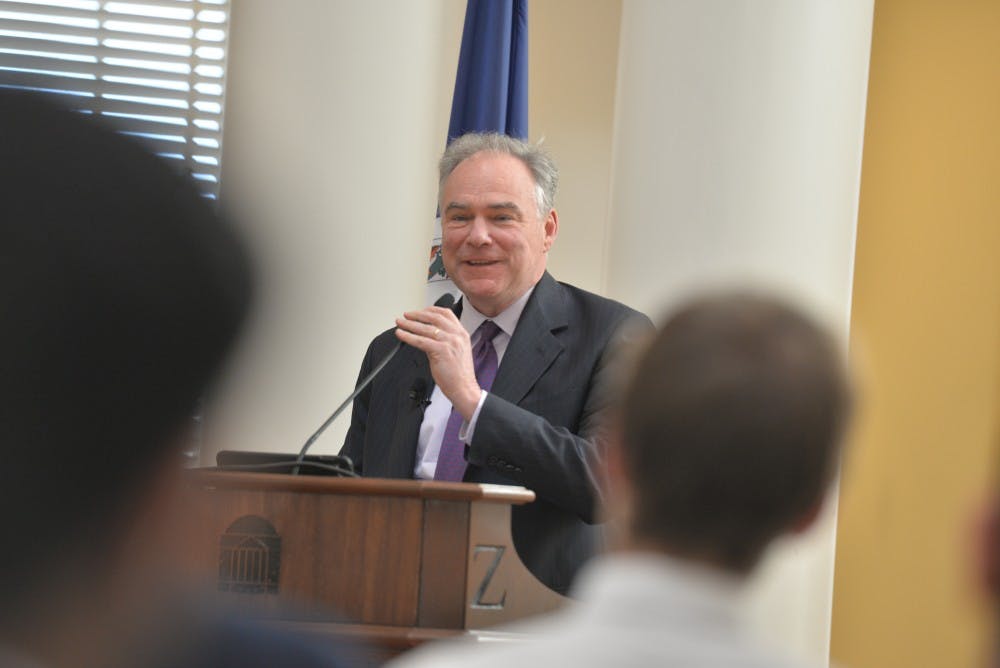Sen. Tim Kaine (D-Va.) spoke in the Dome Room of the Rotunda Friday evening with Miller Center Director Bill Antholis and Law Prof. John Jeffries on the separation of powers in the federal government when considering military action. The panelists specifically referred to the United States’ recent missile strikes in Syria which sought, President Donald Trump has said, to deter Syrian use of chemical weapons.
Kaine said he may have voted in favor of the military action, had it been brought before Congress.
"I think there has to be a consequence for using chemical weapons in violation of Geneva Conventions, and I think that can include military action, so … I did vote to support in 2014,” Kaine said in an interview with The Cavalier Daily. “And there's a fairly good chance if President Trump had come and presented it as part of a strategy, I would have supported it in this instance.”
During the discussion, Kaine mentioned two pieces of legislation he is currently working on — the War Powers Consultation Act and an updated Authorization for Use of Military Force. The War Powers Consultation Act was fashioned after work done in the Miller Center’s National War Powers Commission.
The War Powers Commission was founded in 2007 and was chaired by two former secretaries of state — one Democrat and one Republican. The Commission worked for 14 months and concluded with a report to then-President Barack Obama and Congress calling for a repeal and replace of the War Powers Resolution of 1973, which compels the president to inform Congress before taking significant military action. Nominally, Kaine said, the rule forces the president to withdraw military forces after 60 days if he or she hasn’t yet received Congressional approval, but this is hardly enforced.
“Sen. John McCain and I, in 2014, essentially introduced [the Miller Center’s bill], verbatim,” Kaine said. “We are trying to make the case to our colleagues that the War Powers Resolution is fatally infirm and that we need to now do something better.”
In 2014, Kaine worked with McCain (R-Ariz.) to introduce the War Powers Consultation Act. Under the legislation, the president must consult with an established committee prior to taking “significant” military actions. The committee would include the speaker of the House of Representatives, the majority leader of the Senate, the minority leader of both the House and the Senate and the committee chair and ranking members from the House and Senate committees for foreign relations, armed services, intelligence and appropriations. This makes the committee — just like the War Powers Commission — bipartisan, split cleanly by half.
The War Powers Consultation Act has not been approved, but Kaine is still working to pass it.
Kaine is also working currently with Sen. Bob Corker (R-Tenn.) on an updated Authorization for Use of Military Force. The first AUMF was written after Sept. 11, 2001 and gave the President authority to use military force against any group related to the attacks.
Critics — especially Rep. Barbara Lee (D-Calif.), who was the only vote against the AUMF in 2001 — claim the Corker-Kaine AUMF continues to give the executive branch a “blank check” for military action by allowing the president to expand military operations without geographic constraints.
“Instead of further endorsing perpetual war, we need to insist on an AUMF that is narrow, clearly defined, and respects Congress’s constitutional duty to debate and authorize military action,” a statement from Lee on her website reads.
Reports indicate Trump may also be hesitant about the updated AUMF. An article in Roll Call says the White House has had a “tepid” response to the bill, with National Security Council officials saying the existing War Powers authorizations are “sufficient.”
Kaine said he’s unfazed, though — this is exactly where he wants them.
“I know I’ve hit a sweet spot when the White House doesn’t like it and the Left doesn’t like it,” Kaine said. “There are groups that are saying, ‘This authorization you’re doing with Corker, it institutionalizes the war,’ and the White House is saying, ‘We couldn’t accept this, it puts too many strings and restraints on it,’ so, having alienated a bit on both sides, I know I’ve hit a sweet spot, but I don’t know whether my sweet spot is 60 votes or not.”
Kaine ended the panel by noting both Senate Majority Leader Mitch McConnell (R-Ky.) and Senate Minority Leader Chuck Schumer (D-NY) are likely more focused on winning the majority in the 2018 midterm elections.
“McConnell’s cool to the idea,” Kaine said. “Bluntly, I don’t think Sen. McConnell and Sen. Schumer love this issue. I don't think either of them see it as the way to gain or hold onto a majority, and I think when you're in leadership, you tend to look through the world with that prism — Is this going to help me gain or hold onto a majority? I don't think either of them see this issue is that thing.”







